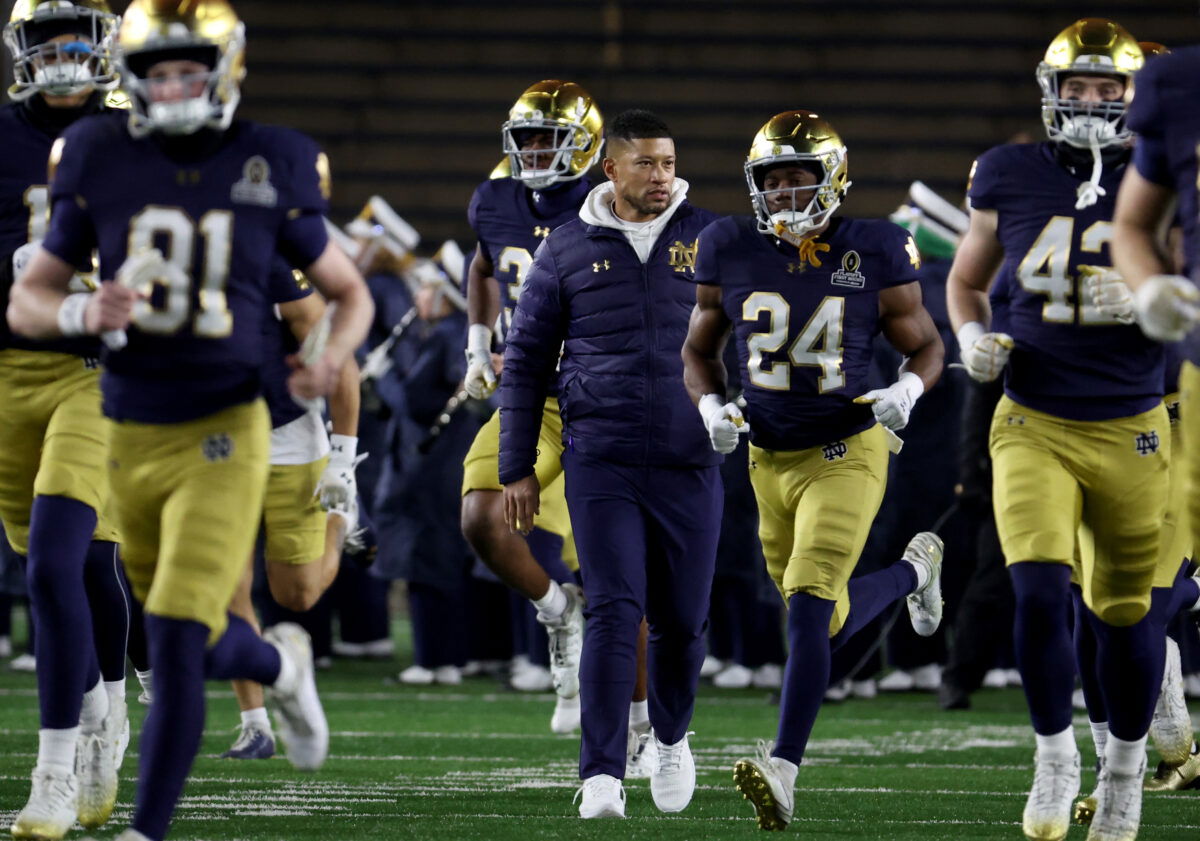
Imago
Dec 20, 2024; Notre Dame, Indiana, USA; Notre Dame Fighting Irish head coach Marcus Freeman leads the team onto the field before a first round playoff game against the Indiana Hoosiers at Notre Dame Stadium. Mandatory Credit: Trevor Ruszkowski-Imagn Images

Imago
Dec 20, 2024; Notre Dame, Indiana, USA; Notre Dame Fighting Irish head coach Marcus Freeman leads the team onto the field before a first round playoff game against the Indiana Hoosiers at Notre Dame Stadium. Mandatory Credit: Trevor Ruszkowski-Imagn Images
Marcus Freeman’s Notre Dame rolls solo with an ‘independent’ tag for more than a century. Sure, they have occasionally joined conferences like we saw them in ACC during Covid, but for the most part, the independent tag almost stood like an iron curtain as they withstood the tides of NIL money, broadcasting rights, and even the rumblings of the transfer portal. This was probably because of the $20 million sole payout for their playoff games (in recent years), and it made sense, too. Since Notre Dame remained independent and bagged in all the broadcasting money without having to share a penny. But now, with time, there may be some inner reflection, as the Irish have just signed a deal, which might not make them a part of a conference, but it’s a start and a signal of just that.
Watch What’s Trending Now!
We all know how the broadcasting rights work in college football and how billions of dollars are guaranteed for conferences every year. Currently, the Big 10 and SEC are the top dogs, as the Big 10 gets more than a $7 billion deal with Fox, CBS, and NBC that will run til the year 2029-30. Moreover, the SEC had announced a $3 billion 10-year TV deal with ESPN in 2020. Now, Marcus Freeman’s Notre Dame is also after the same money that conferences promise.
The ACC conference’s viewership might not be the same as the Big 10 or SEC, but it still is the ‘power’ conference and thus has signed a deal worth $3.6 billion in 2012, which was recently extended to the year 2036. So, Notre Dame, having experienced the flavors of the ACC before in 2020 and even made it to the conference championship, has now finally agreed to put pen to paper on a deal involving the ACC powerhouse Clemson Tigers.
ADVERTISEMENT
NEW: Clemson and Notre Dame have agreed to a 12-year football series running from 2027 to 2038, @RossDellenger reports.https://t.co/dKZlZOb1fj pic.twitter.com/WJMVBY7I4Z
— On3 (@On3sports) May 6, 2025
Ross Dellenger of Yahoo Sports recently posted about the 12-year deal between Clemson and Notre Dame on his X account. “Notre Dame & Clemson have struck a 12-year annual football scheduling deal, sources tell @YahooSports. The series works independently of the ACC structure, but does count as one of ND’s five ACC games. Irish also expected to play FSU & Miami more regularly.”
The newly signed deal may look optimistic, but it may not be too easy to manage the schedule and also top the playoff rankings with the strength of schedule in mind. The context? Well, it’s not a secret that conferences like the ACC and the Big 12 have somewhat lagged behind in viewership, and hence the money part, too. Moreover, the Irish’s current scheduling agreement with the ACC requires them to play 5 games with the top ACC teams. So now, with the Clemson deal, they might feel a bit of a task to accommodate the other teams like FSU or Miami. But even if they are able to do that, this could bring other concerns.
ADVERTISEMENT
We saw last year FSU’s imploding as they produced the worst season since the 1970s and finished 2-10. Now, because of that, the teams who played them got a bit less in strength of schedule rankings, and this is something Notre Dame has to be wary of. The Clemson games sure will be thrilling as the Irish will play five games spanning in 2027,2031, and 2037 at Clemson and the rest of two in 2028 and 2034 at Notre Dame. But what if the other 4 games involve teams like Stanford or Louisville, who, with their weak performance, could make the Irish’s resume weak?
ADVERTISEMENT
FSU and Clemson’s future in the ACC
Both FSU and Clemson had an ugly history in the ACC. Both programs had sued the ACC as they wanted to exit the conference without giving any penalty ($165 million). The contention arose after the teams claimed a greater share of revenue, which the SEC and Big 10 are giving to their most-viewed teams. The teams, now, however, have withdrawn their lawsuits, as they have received assurances about greater revenue along with games with Notre Dame. But will it be financially beneficial still?
In a recent statement, the host of College Football Addiction showed how staying in the ACC could be detrimental for the teams financially. “Florida State and Clemson cannot make up enough of that Gap that $35 million gap this year (2025) and then that $50 million gap in 2030 (expected) if they go on for four, five, six years, making an average of $42 million a year less than their peers. You’re talking about almost a quarter of a billion dollars, and that doesn’t even count how much money the SEC is going to make from the playoff when they likely have four auto bids coming up.”
Top Stories
Bills Officially Cut Ties With 4 Players as Josh Allen Remain Without HC After Philip Rivers Quits

ICE to Conduct Immigration Enforcement at Patriots vs. Seahawks Super Bowl LX at Levi’s Stadium, as Per Official

Strahan Family in Mourning as Michael Strahan’s Cancer-Free Daughter Grieves Close Friend’s Loss After Cancer Battle

Travis Kelce Makes Major Career Decision as Chiefs TE Contemplates Retirement

Jerry Jones’ Cowboys Make Triple Firing Decision After Blocking Coach’s Exit

Coco Gauff Smashes Racket in Anger After Losing in Just 59 Minutes at Australian Open

Well, the statement shows some realities too, as both, according to the recent proposal, the Big 10 and the SEC are getting 4 automatic playoff bids each. On the other hand, ACC and Big 12 would be getting 2 bids each, which could place them at the bottom of the footballing food chain. For now, both teams could benefit from the viewership that Notre Dame games would bring.
ADVERTISEMENT
ADVERTISEMENT
ADVERTISEMENT
ADVERTISEMENT



